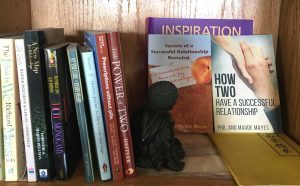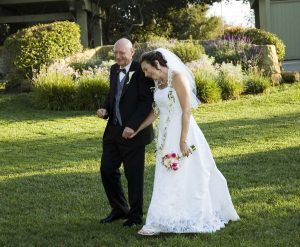Maude Mayes's Blog: Secrets of a Successful Relationship Revealed, page 86
August 9, 2017
Successful Relationships Reading Corner
 In this week’s blog, we asked what overlooked things are important in a successful relationship. Here are some good posts offering their answers.
In this week’s blog, we asked what overlooked things are important in a successful relationship. Here are some good posts offering their answers.
Ten Elements of Effective Relationships “The other day, a friend pointed out that I very often write from the perspective of what people are doing wrong, as opposed to what they are doing right. Well, here are some things that I have found to be effective elements in a successful relationship; the right stuff.”
What Research Tells Us About the Most Successful Relationships “There’s no single ‘formula’ to a perfect relationship. However, we’ve studied an awful lot about what successful couples do. Everyone’s relationships are a bit different, but we can take away a lot from what we know works. While a perfect relationship might be beyond the grasp of science, studies on what makes a relationship successful are everywhere. Over the years, these studies have come up with some trends that help us better understand what sets a long lasting relationship apart from one that ends quickly.”
Relationships – tips for success “A ‘good relationship’ means different things to different people. However, good adult relationships generally involve two people who respect each other, can communicate, and have equal rights, opportunities and responsibilities. Most people would also expect their relationship with their partner to include love, intimacy, sexual expression, commitment, compatibility and companionship.”
August 6, 2017
What Overlooked Things are Important in a Successful Relationship
 We try to write and teach about things that come from our direct experience, rather than from theories of relationships. As often happens, we went to breakfast this Friday morning to choose a blog topic. Maude suggested tone of voice, but felt dismissed when Phil said “Yes, but….” Phil’s response was then interrupted by Maude commenting.
We try to write and teach about things that come from our direct experience, rather than from theories of relationships. As often happens, we went to breakfast this Friday morning to choose a blog topic. Maude suggested tone of voice, but felt dismissed when Phil said “Yes, but….” Phil’s response was then interrupted by Maude commenting.
We’ve been together long enough to recognize these patterns and express our right to be heard, so we yet again pointed them out, but this meta discussion didn’t get defensive. Instead, it consisted of getting our original points across and critiquing the ways the communication had failed. It wasn’t seen by either of us as a struggle to be right; it was a way to reconcile our different styles.
What is important is that we addressed this immediately. This brought about a very fruitful conversation on what we do and how we are with each other that prevents distance from growing between us. In essence, we’re telling this story because it illustrates a number of points.
When things between us stop being smooth, we are conscious of it,
and take steps to deal with it,
because the connected partnership we have is so valued by both of us.
It is easy to do because we have a history of doing this successfully.
We know we have the same core values, and so there is nothing to argue over, and we can
appreciate our individual differences and the variety they bring.
Besides these points about communication, what else helps us maintain our flow?
As we have written many times, touch is very important. We have observed that we seem to always be touching lightly when we are working on problems and looking for mutual solutions. Staying in physical contact greatly influences the process and outcome. It sounds like a small thing. It isn’t!
Something else that is as important as touch is tone of voice.
We have friends that have been a couple for a really long time. They are deeply in love and have developed a very committed relationship, but for the longest time it was really hard to be with them. The tone of voice that she used when talking with him or commenting on him was grating. It seemed to portray impatience, disdain, and even disregard. It made us flinch and feel like we wanted to get away from that couple as fast as we could, yet they loved each other and found their way to eventually replacing this disrespectful behavior.
In a relationship, it’s important to address things before they fester! #quote #relationships #love
Click To Tweet
People often take their partners for granted and don’t take enough time to share thoughts, speaking hurriedly or disregarding their tone of voice. This can lead to unrealized hurt, and unwanted distance being created between mates.
What is the answer to this type of behavior? Respect. Always convey with your words and your actions the high regard you hold your partner in and the respect you have for them. This is paramount for us and that is why it is so obvious when there is any deviation. In those instances, we are able to quickly address them without any real misunderstandings occurring. We are able to use any such disjointed moments as growth experiences for each of us and our relationship.
You may not have an unblemished background like ours to draw on. Nonetheless, past is past, and if you want to live this way, all you need is awareness and intention.
Many of these things are little, but is is these things that build up and often lead to estrangement between couples. And often these moments and hurtful events are so small they go unnoticed and unrepaired, till they culminate in a crescendo of distance! Don’t let this happen to you. Pay attention and give each other the time and respect that your love deserves!
August 2, 2017
Successful Relationships Reading Corner
 In this week’s blog, we discuss how being intolerant keeps your relationship in balance. Here are some postings on balance in relationships.
In this week’s blog, we discuss how being intolerant keeps your relationship in balance. Here are some postings on balance in relationships.
How to Balance a Healthy Love Relationship “Life’s emotional ups and downs can cause conflict in a relationship. Recognize that your partner may react to and solve her problems in a different manner than you do. Avoid taking your stress out on each other. Remain open to change and confront problems as they arise.”
The Happy Couple Cheat Sheet: 15 Steps to a Balanced and Happy Marriage (Relationship) “I would like to share my experience of a happy and balanced marriage. I hope that maybe these tips will help some couples to live happily ever after.”
Relationship Advice: How to Have a More Balanced Relationship “Lately I’ve been spending a lot of time thinking about relationships. Specifically, I’ve been trying to figure out how to have more balance in all my relationships. Because even when you think everything is fine, you may find out that people you care about or work with (or both) feel otherwise.”
July 30, 2017
How Being Intolerant Keeps Your Relationship in Balance
 Some areas of behavior are so deeply a part of a relationship that they seem to occur naturally and receive very little conscious attention. These very same areas can often be critical pillars upon which successful relationships are built.
Some areas of behavior are so deeply a part of a relationship that they seem to occur naturally and receive very little conscious attention. These very same areas can often be critical pillars upon which successful relationships are built.
That’s how it is with maintaining balance within your relationship. Balance, you ask, “What exactly do you mean by that?” We refer here to a way of being with each other. One in which the bond of union and the sense of being connected and on the same side pervade all your interactions: the way you speak to each other, the tone of voice you use, the attention you pay, the way you listen to your partner, the respect you show.
But nearly everyone has had a relationship where something went wrong: you were bad-mouthed or felt unsupported, a financial agreement was breached, or even worse. The ensuing argument can get pretty bad, especially when other wrongs are dragged in – “Well, you always….” This is what Maude refers to as keeping lists, even if not consciously; they emerge in an argument like a pile of rocks at hand, ready to throw at the enemy. The argument escalates, spreads, and finally ends through resolution, surrender, exhaustion or revelation, but it generally leaves wounds and scars that can affect the relationship for some time, just as a damaged knee can bother you for years.
Be clear what your relationship values are; don’t stray too far outside those boundaries
Click To Tweet
Better than an auto repair shop is not getting into a crash in the first place, and in relationships, the method is counter-intuitive: have a low tolerance for mistakes. Be very clear about what your values are for your relationship, and don’t allow deviations too far outside these boundaries. This is probably one of the only areas where a low tolerance is appropriate!
Some time ago Phil expressed what might be described as a snippy attitude several times, and Maude called him on it immediately, pointing out that this type of behavior created rather quickly a distance and distrust that had no place within the relationship. Phil reflected on it and saw that truth right away, and Mr. Snippy was permanently retired! Crisis averted long before it even became a point of contention.
So by being very clear about what our values are in our relationship, we are able to live that way and remain in balance. Letting things slip and get out of balance is when you fall off the bicycle.
You might think that this advice is completely at odds with our frequent admonition to let your partner be completely themselves, without you controlling them in any way. It’s not. By bringing up the issue early on, when there is no intense emotional charge, and by making it personal, as in “I feel uncomfortable when…” rather than accusatory, you start a dialog that may lead to a realization that how the dishes are done is simply a cultural difference and not a life-threatening crisis, or you may conclude that respect is a core value for you, and being snippy is incompatible with that.
A peaceful relationship exists in a place where no matter what is happening in your external world and no matter how you feel, a natural balance in your relationship underlies all of your interactions. It is not dependent on the changes we all experience or the vagaries of our lives. This place of calm and love that is shared stands apart from any such changes.
So be tolerant and accepting of each other, but do not let those old destabilizing actions enter your exchanges. Stay in balance, the same way constant little adjustments keep you balanced on your bike. Be loving and present with your partner and guard that precious union, not ever taking it for granted. Happy riding!
July 26, 2017
Successful Relationships Reading Corner
 I, Phil, wrote about how to reach union in your relationship in this week’s blog, and found it hard to find good links. Maude is the link-finding expert! A couple of these are on consciousness, which is for me a perennial fascination.
I, Phil, wrote about how to reach union in your relationship in this week’s blog, and found it hard to find good links. Maude is the link-finding expert! A couple of these are on consciousness, which is for me a perennial fascination.
Healing Relationships Through Compassion and Connection “When we choose to make our relationship with our partner a spiritual practice, we enter a sacred journey of ever-deepening love and freedom. The path is challenging, yet with purity of intention and clear attention, the very circumstances that threaten to drive us apart can open the gateway to the blessings of communion.”
Consciousness: Who’s at the Wheel? is one of a series of conversations; here they discuss the idea that our sensory experience is necessarily coupled with the world: “You’re leaving something rather large out of the equation. In the case of pressing the button, for example, you’ve forgotten the button. In the case of John’s kiss, you’ve forgotten Mary’s lips. You are speaking as if the brain were entirely separate from what is outside our bodies.”
How Does The Human Brain Create Consciousness? “Does the brain create consciousness? I’m not so sure. At the very least, I know that no neuroscientist has caught the brain “red-handed” in the act of creating consciousness. The standard materialist position is that consciousness is tied up with the brain. There is plenty of evidence that the brain influences consciousness (and vice versa!), ranging from studies of brain damage to the well-known effects of mind-altering chemicals. The problem with going any further than this correlational fact is that no one knows how to define consciousness from an objective, third-person perspective. We only have access to one consciousness: our own.”
July 23, 2017
How to Reach Union in Your Relationship
 This is Phil, and I’m writing this week because Maude is attending a conference. I’m going to end up talking about relationships, but let’s start by talking about identity. I know what you’ll say. You’ll give your name and your address and whether you’re married and where you work and you’ll point at your skin as the boundary between you and the world, and that’s that. Finger prints, driving license, birth certificate; the evidence is clear.
This is Phil, and I’m writing this week because Maude is attending a conference. I’m going to end up talking about relationships, but let’s start by talking about identity. I know what you’ll say. You’ll give your name and your address and whether you’re married and where you work and you’ll point at your skin as the boundary between you and the world, and that’s that. Finger prints, driving license, birth certificate; the evidence is clear.
But that’s your physical body, existing in the material world, tagged and categorized by society. Now where we’re going may be a bit of a mental leap for some people, especially if you hold that consciousness resides in the brain, but bear with me. At some point, this will click. When I was learning a new topic in maths (it’s plural in England) at school, I would be confused for several weeks until I grasped the concept.
The question that cracks it open is what you are. Keep asking and answering, and besides your body, you’ll start to offer your profession, your history, your hobbies – I don’t know exactly what your responses will be, but I will point out that one of the things you are is human.
But now back to the identity question. All of the things you have said you are also are part of your identity. You’re a Mets fan, say, and you identify with Mets fans everywhere. If space aliens arrived, signed the team and took them to Sirius, it would feel as if a little part of you had been ripped away. And so it is for all the other things you are, including being human. Your sense of self encompasses all of those, and I want to point out what may not be immediately obvious: that these senses of self are visceral; that you feel you are an engineer or a mother or a Mets fan much more than you think it. That knowledge comes from within. Your sense of self is actually more than just your body.
Now that may sound like crazy speculation, but if so, that’s because in the West we have long been taught that every question has a single correct answer, from Aristotle and his logic through Newton to rocket scientists, but if you can adopt the improv comedy trick of saying “A and B,” you allow yourself extra ways to see the world, and finally I am ready to talk about relationships.
Your experience is a co-production of you and the world. #quote
Click To Tweet
Our sense of self as a separate being comes from the senses, but they are not just nerves firing on their own; they are responding to something, and your experience is a co-production of you and the world. So your relationship with another person, whether fleeting or deep, is co-created by both of you. It’s not the same for both of you, but the experiences are intimately related; think of the shape of contact when you shake hands with someone. The shape of their contact with you is different, bur directly related to yours.
And so it is with relationships. Each one is unique; it is something you create together; it is different for each of you, yet your experiences match in the same way that two hands meet in a handshake. Every relationship has its own flavor and character, just like every flower or movie or cloud is different. Coffee with Sue is different from coffee with Jane. Savor the uniqueness of each one by feeling what it is like to be in their presence.
So this is the source of union in a personal relationship. It is the direct experience of your partner. It can co-exist right alongside your own self at the very same time. Make a space in your belief system for it to exist, and slip out of the house while your ego is not looking. It’s a big world we live in.
July 19, 2017
Successful Relationships Reading Corner
 In this week’s blog, we discuss how to keep your relationship in the honeymoon phase. Here are some postings we think you’ll enjoy.
In this week’s blog, we discuss how to keep your relationship in the honeymoon phase. Here are some postings we think you’ll enjoy.
Can the Honeymoon Phase Last Forever? “A recent New York Times article told us something we already knew, but don’t like to hear: Newlyweds enjoy a big happiness boost that lasts, on average, for just two years. Of course, you may have heard that once or twice from me. But the NYT says it a lot better:”
The “Honeymoon” Period Of Relationships Explained “The honeymoon period of relationships – how can psychology explain it? and does the honeymoon period actually have to end? This is not to claim its the one size fits all answer but if you give this some thought you may find there is quite a bit of truth in this.”
18 Signs the Honeymoon Phase of Your Relationship Never Ended Eighteen snippets of advice that we liked.
July 16, 2017
How to Keep Your Relationship in The Honeymoon Phase
 During an early morning embrace, Phil asked “When does the honeymoon end?” (Just to put this in context, we have been together for 12½ years!) This started a really fun conversation on how the honeymoon phase of a relationship is usually viewed and what it is that we experience, and, of course, led directly to this blog!
During an early morning embrace, Phil asked “When does the honeymoon end?” (Just to put this in context, we have been together for 12½ years!) This started a really fun conversation on how the honeymoon phase of a relationship is usually viewed and what it is that we experience, and, of course, led directly to this blog!
Very often, people talk about a relationship as having different phases, and most people teaching and working with relationships describe the honeymoon phase that lasts a relatively short while and then must be replaced by a deeper type of union. What is being referred to is the biochemical response we have when we first feel connected and excited about a partner. Ideally this is slowly replaced by a growing relationship built on shared core values.
Often what we come to know better and get used to, becomes taken for granted, and as a consequence, is remembered in mind rather than experienced in the present. Imagine that you walk the same route every day. So much remains the same. That rusting car is still in the driveway. The gravel always crunches underfoot. The corner store always has firewood for sale.
Yet in life, nothing ever repeats exactly. Your walk on Tuesday is different from the same route on Monday. The weather is different. Your thoughts are different. The cat who greeted you isn’t there a second time. You are affected by the events of the day, whether work or politics or the friend you met for lunch.
This is how it is with our relationship. Every time we come together is changed by the experience of how we were the last time. Every time we make love, we step into the union of the previous time. Our experiences accumulate, making each one new and different. The present is never a repeat of the past.
You see what you look at. If you look at your partner and see the same clothes or the same jokes or the same meals, you’ll miss the constant novelty of life. This is one of the mistakes that lead couples down the path of estrangement and distance from one another.
The honeymoon phase is biochemical, but you can keep the spark alive #relationships #marriage #quote
Click To Tweet
To have a successful relationship, one filled with peace and joyful passion, there are elements that must be present. Each couple may express them differently, but the same characteristics will be found.
These are some of the things that sustain us and have us experiencing the honeymoon as never ending:
We know that we are always on the same side – we want the best for each other at all times.
We share and express who we are with each other truly and completely.
We know we are fully accepted for who we are and have no need to defend ourselves.
We have no fear of the paradox of constant change, as it is balanced by our constancy with each other.
We live in the present together; not in our minds with expectations and projections of what will or should be, but with what is (which is too delicious to trade for what we make up!)
We have an unbroken connection whether we are together or not. Nothing occurs that creates any real distance between us.
These very basic elements may express themselves in many different ways. They may change the way they are expressed as time and situations change. However, in any vital, living and juicy relationship you will find them present. Look at your own union and check whether any of these characteristics are absent. This is a good place to start sharing and repairing if you find any missing or broken.
The honeymoon does not have to ever end! Celebrate your differences and experience each other in the moment you are in. Let’s spread peace one relationship at a time.
July 12, 2017
Successful Relationships Reading Corner
 In this week’s blog, Phil wrote about the importance of belief and intention in a relationship, and here are some articles on that. Maude wrote on this subject the previous week, so last week’s reading corner also covered this area.
In this week’s blog, Phil wrote about the importance of belief and intention in a relationship, and here are some articles on that. Maude wrote on this subject the previous week, so last week’s reading corner also covered this area.
9 Relationship Mantras to Keep the Peace “When we attack, we cannot love. The intent of these relationship mantras is to lighten the drama and inspire more peaceful interactions.”
Redefine Relationships Through Peace and Authenticity This post draws from “The Power of Intention” by Dr. Wayne Dyer “Being peaceful and authentic can define your relationship with your relatives. First, though, you may have to assess your relationship with the closest relative of all – you. How others treat you, you’ll discover (if you are brave and honest!) has a lot to do with how you treat yourself and thereby teach others to treat you.”
20 Life Skills to Keep Peace in Your Relationship “It is inevitable that in every relationship there are going to be differences, and everyone has days when their emotions can get the better of them. The problem is not that we have differences in our relationship, the problem lies in the way we handle those differences.”
July 9, 2017
The Importance of Belief and Intention in Relationships
 We were recently interviewed by Michael and Jacqueline for The Intimacy Connection Talk Show. One of the topics that came up was belief and intention. Maude wrote about this last week in her own voice, and this week, it’s me. We hope this stereo signal adds depth to the subject.
We were recently interviewed by Michael and Jacqueline for The Intimacy Connection Talk Show. One of the topics that came up was belief and intention. Maude wrote about this last week in her own voice, and this week, it’s me. We hope this stereo signal adds depth to the subject.
Software developers use an ugly acronym, WYSIWYG, meaning What You See Is What You Get. It applies to user interface design, and there’s no need to explain it here. I want to rewrite it for relationships and say What You Expect Is What You Get.
People have a variety of expectations about relationships, even when they are not aware of them:
The man is in charge of finances
The woman is responsible for emotional maintenance
Cheating is always to be expected
They always fall apart
They are a power struggle
Problems and the ensuing arguments are inevitable
What you believe comes to pass; change your expectations, change your relationship #relationships
Click To Tweet
When you bring one of these into a relationship, they tend to come true because a) you act in such a way that it comes to pass, and b) you see it because you expect it. Ideas like these come from what we learned from our families, our fumbling steps in early relationships, the media telling us that all relationships are hard work, and a culture that says that the law of the jungle rules and competition is king.
But life is far more cooperation than competition, nowhere more so than in a relationship. Maude and I were graced by a peaceful quality from the beginning, and as we experienced this manifesting in the harmonious way we were together, we felt an obligation to explore the reasons and tell the tale of its existence. We knew that believing in the very possibility of such concord was a challenge; that was why we wrote several books, and continue to write this blog – to say that such a relationship is possible. Because without that image to believe in, you may settle for less.
Imagine that Maude and I know about a wonderful but obscure State Park. If you haven’t heard of its existence, you won’t go and visit it. But even when you do know about the park, you have to make the effort to get there. And so it is with relationships; even when you believe good ones exist, you have to intend to have one yourself, you have to want one, you have to change what is currently not working for you. It should go without saying that your partner ne
eds to also hold a similar belief and intention.
It may take a while to get used to such a different experience, because existing misery has a comforting familiarity, but the results are so rewarding that you will rapidly want nothing else. A successful relationship is like a bicycle; once you can ride it, you never lose your balance and fall off.
Secrets of a Successful Relationship Revealed
We use this blog to continue the exploration of the magic that can be found in a relationship, and the wider implications of peace for the world. ...more
- Maude Mayes's profile
- 8 followers



